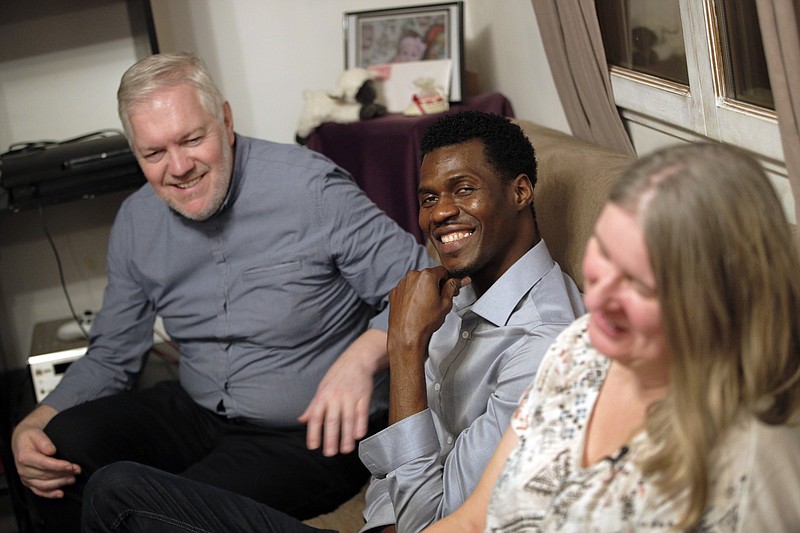PALAISEAU, France (AP) - When the Gandais family decided to host a refugee at their home in a middle class neighborhood outside Paris, they assumed their guest would be a Syrian or an Iraqi fleeing war.
Instead, a 25-year-old journalist with a young family in the former French colony of Guinea is the person sleeping gratefully in a spare bedroom, sharing unfamiliar food and nourishing hopes for a better life.
As anti-immigrant sentiment and anti-Muslim views find footing in Europe and elsewhere, the Gandais family has found welcoming a refugee into the house to be a source of happiness.
"The experience is much more enriching than costing," says Loic Gandais, 56, a public servant for the Paris region.
His wife, Murielle Gandais, 54, first raised the idea last summer, responding to the French government's call for solidarity amid the migrant crisis in Europe. She and Loic have three adult children in their 20s -two of them still living at home. Everyone quickly agreed they wanted to be a host family.
During a process not dissimilar to adoption, a humanitarian organization, Samu social de Paris, visited the Gandais' house to make sure they had a suitable bedroom available. A psychologist spoke with family members about their motivations and expectations for sheltering a stranger who had experienced difficulties they would find hard to comprehend.
"Someone's coming who is fragile because he lived difficult things, is coming to France and is alone. That's not easy. But at the same time, it's someone who has things to share," Murielle Gandais says.
The shy, tall young man selected to stay with them was Cheikh Ahmed, a married father of 4-year-old twins from Guinea. He left his country and family behind two years ago because he felt his life was in danger from his reporting on a sensitive issue.
He asked for his last name and other personal details to be withheld because he still fears for his safety.
Cheikh Ahmed lived for two months on the streets of Paris in a filthy camp of migrants periodically evacuated by police. He begged for money on the subway and saved enough to have his personal documents sent from Guinea to France so he could apply for asylum as a political refugee.
From the street, he went from staying with a Guinean friend to an overcrowded hotel paid for by social services until finally being welcomed by the Gandais family. Sitting on his wide, comfortable bed, smiling widely, Cheikh Ahmed says he feels as if his dignity has been restored.
"Imagine living on the streets. It is not a life," he said. "You cannot properly wash, you don't eat well and when you sleep, often police or other people come to wake you up."
Cheikh Ahmed is a Muslim, hosted by a Christian family, but religion has not been a barrier to intimacy or acceptance on either side. He speaks French, English, a bit of Spanish and the three national languages of Guinea - Susu, Pular and Maninka.
Murielle and Loic are used to having a full house between their children's friends and relatives. Murielle recalls it took Cheikh Ahmed a while to open up about his life.
"In the beginning, we felt he didn't want to talk about Guinea or anything," she said.
After three months with the Gandais, Cheikh Ahmed is at ease in the kitchen, sets the table and helps himself to food. He has gotten used to their rules and rituals, such as having the housekeeper clean his room and clothes as she does for other family members.
He feels comfortable enough to laugh out loud at the dinner table, although he still can't stomach eating cheese - a staple of the French diet, he jokes.
Now that he has a part-time job as a salesman at a clothing store, Cheikh Ahmed is starting to build a life in France. The Gandais often check on him, calling to see if everything is OK when he's out and about. He can stay with his host family as long as he needs to afford his own apartment.
"I feel loved. I feel surrounded by people who care about me," he said.
Cheikh Ahmed says he looks forward to the future, when he will bring his wife and children to France.
"Everyone gets a turn at the hairdresser," he said, quoting an African proverb that in Guinea is the equivalent of saying "good things come to those who wait."
France granted refugee status to 26,531 people last year, compared to the 256,136 granted asylum in Germany. Samu social de Paris started recruiting host families in June, focuses on refugees who have obtained asylum but still are living in shelters or other short-term accommodations, if not in the street, program chief Nadege Letellier said.
About 30 French families have joined, and they are looking for others. The program hopes to place at least 336 refugees in the Paris region over the next two years.
Most come from Afghanistan, Tibet, and several African countries like Sudan and Eritrea. Many are men under age 25 who have fled war, violence and persecution due to their ethnicity, sexual orientation or political activities. The program includes a few women as well.
Loic Gandais deeply regrets the "wave of xenophobia and racism" he thinks is being encouraged in France and Europe by populist far-right parties. Even though there has been a temporary stay on U.S. President Donald Trump's ban on travelers and immigrants from seven predominantly Muslim countries, he calls that policy "a nightmare."
Murielle Gandais encourages other families to reach out to refugees, saying there is nothing to fear.
"There might be some difficulties, but in the end there can only be a positive outcome," she said.
